Edition: 15 to 26 July 2024
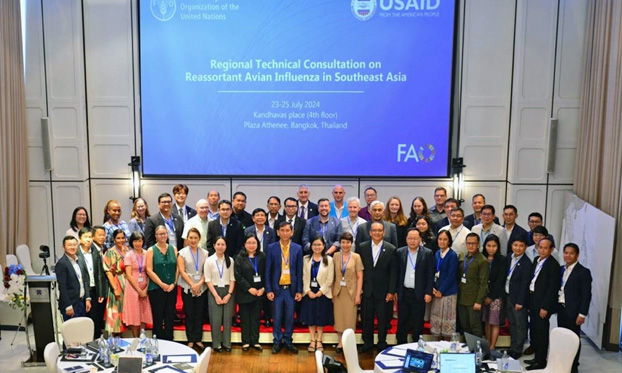 © FAO/In Jang | ASIA AND THE PACIFIC Regional technical consultation on reassortant avian influenza in Southeast Asia
FAO organized a Regional Technical Consultation on Reassortant Avian Influenza in Southeast Asia with financial support from the United States Agency for International Development (USAID), and in collaboration with One Health partners, the US CDC and WHO. The consultation provided a platform for experts from the Greater Mekong Subregion (GMS) countries along with Indonesia and the Philippines to share the latest developments concerning HPAI A/H5Nx, identify current surveillance limitations, propose strategies for enhanced virus detection, and conduct a simulation exercise for regional joint risk assessment. Read more here. |
-and-national-public-health-laboratory-(nphl).jpg?sfvrsn=70f971b1_1) © FAO/Surendra Karki | NEPAL Meeting between Central Veterinary Laboratory (CVL) and National Public Health Laboratory (NPHL) FAO, through the USAID funded Global Health Security Project, supported the Central Veterinary Laboratory (CVL) to conduct a meeting between reference laboratories of animal health and human health, CVL and NPHL respectively on 19 July at CVL. The objective of the meeting was to enhance the coordination between the reference laboratories and share the information on current zoonotic disease detected in both sectors has been shared thereby promoting one health approach and strengthen the coordination between the reference laboratories. The meeting was attended by chiefs of CVL and NPHL along with senior officials working in various units of both the laboratories, FAO and WHO. . |
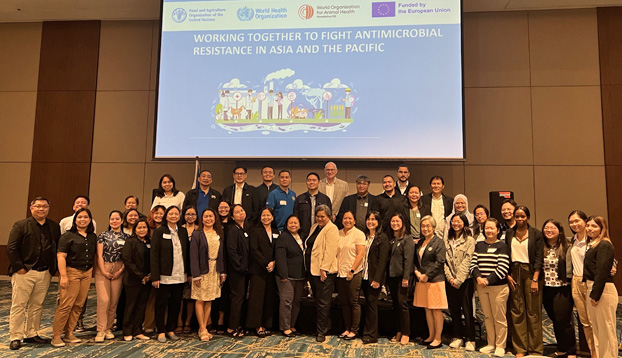 © EU AMR Project | THE PHILIPPINES Private sector engagement on AMR On 18 July, FAO, together with the Bureau of Animal Industry (BAI), the Philippine Veterinary Medical Association (PVMA), and the National Advisory Committee on Animal Disease Control and Epidemiology (NAC-ADCE), organized the Private Sector Engagement on AMR workshop in Quezon City. Representatives from various organizations from different subsectors of the country’s livestock industry, such as poultry, swine, animal feeds, veterinary drug subsectors, and national and local government units attended the workshop. The workshop aimed to foster better engagement of the private sector in the livestock industry and to encourage public-private partnerships to combat the development and spread of AMR. This workshop was funded by the European Union-Regional Tripartite AMR Project with technical support from the Fleming Fund and the USAID GHS Project. |
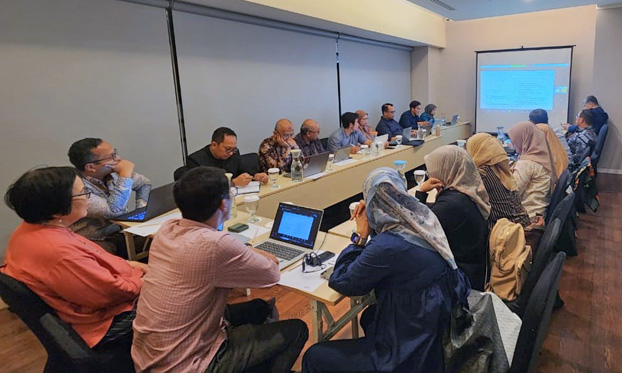 © FAO/Elysa Mayor | INDONESIA Discussing strategic plan with the Ministry of Agriculture FAO and the strategic planning team (Renstra) from the Directorate of Veterinary Public Health and Animal Health at the Indonesian Ministry of Agriculture (MoA) discussed on the preparation of a strategic plan for the Directorate General of Livestock and Animal Health Services (DGLAHS) from 22 to 23 July 2024. The meeting focused on the livestock sector's role in food self-sufficiency and public health, facilitating stakeholder coordination for effective implementation of the zoonotic control strategic plan. It also covered achievement indicators for animal health and zoonosis, supporting the goals of DGLAHS MoA. |
Learn more about our work on partnerships here. | |
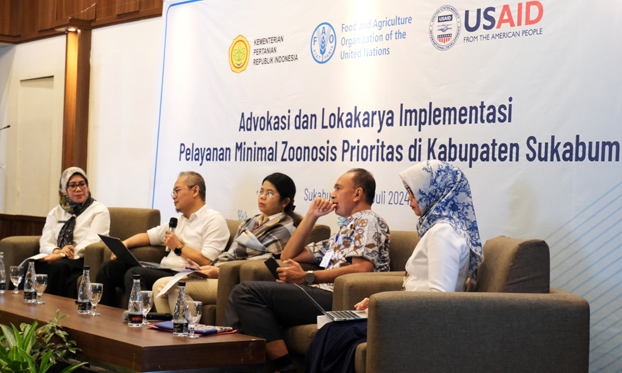 © fao / /Alia Dwirahmani | INDONESIA Implementing Minimum Service Standards for Priority Zoonotic Diseases in Sukabumi Regency FAO and the Directorate General of Livestock and Animal Health Services (DGLAHS) at the Ministry of Agriculture (MoA), with support from USAID, launched a program to implement Minimum Service Standards for Priority Zoonotic Diseases in Sukabumi Regency from 24 to 25 July 2024. The program incorporated a workshop involving Coordinating Ministry of Human Development and Cultural Affairs (CMHDCA), the National Disaster Management Agency, the Ministry of Home Affairs (MoHA), the Regional Development Planning Agency, and local government officials. Following the workshop, DGLAHS-FAO-USAID activities under the Global Health Security Programme were aligned with the Minimum Service Standards for sub-disaster services. |
Learn more about our work on capacity development here.
| |
.jpg?sfvrsn=4af82642_1) © FAO/Surendra Karki | NEPAL Finalizing curriculum for Field Epidemiology Training Program for Veterinarians (FETPV) FAO, with support from USAID funded GHSP and Pandemic Fund, conducted a residential workshop to finalize the curriculum of Field Epidemiology Training Program for Veterinarians (FETPV) from 25 to 26 July 2024. The workshop, conducted in collaboration with the Department of Livestock Services was attended by senior government officials, subject matter specialists, field epidemiology training alumni, Agriculture Information Training Center and academia. |
Learn more about our work on epidemiology here.
| |
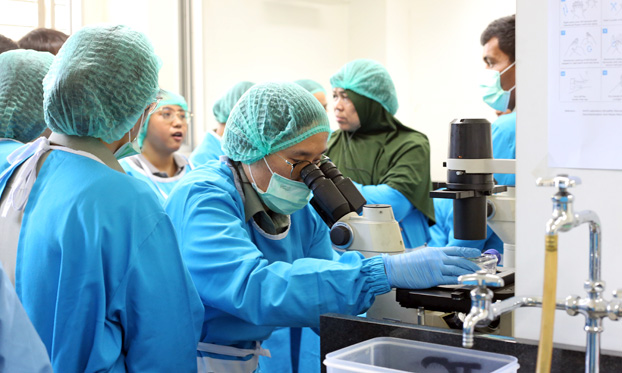 © FAO/DIC Medan | INDONESIA Cell culture training in North Sumatera
FAO, the Indonesian Ministry of Agriculture (MoA), and the Disease Investigation Centre (DIC) Medan, with support from the Republic of Korea, held a training on cell culture, focusing on African Swine Fever (ASF) and Swine Influenza Virus (SIV) from 17 to 26 July 2024. The DIC Medan serves as the national reference laboratory for swine diseases including ASF and SIV. The training was conducted by recourse persons from Seoul National University (SNU). ASF has been affecting Indonesian swine farms since 2018, and Indonesia has been working to contain the disease ever since. This training is part of a collaborative effort by the FAO and MoA to isolate the ASF virus. The initiative aims to enhance the laboratory's ability to characterize the virus, monitor its spread in Indonesia, and ultimately improve control measures. |
Learn more about our work on capacity development of laboratory here.
| |
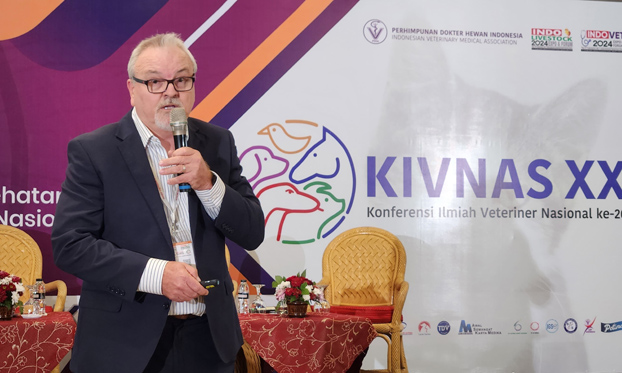 © FAO/Andri Jatikusumah | ASIA AND THE PACIFIC AND INDONESIA Addressing food security issues at the National Veterinary Science Conference
FAO’s foresight expert Peter Black, supported by USAID, delivered a presentation on "Food Security: Futures Focused Policy and Planning" during the plenary session of the 20th Indonesian National Veterinary Science Conference (KIVNAS) in Jakarta. The presentation highlighted the critical need for advanced policies to tackle food security challenges worsened by a growing population and climate change. With temperatures set to rise above 2°C by 2045, Black emphasized the value of foresight methods in understanding and addressing these issues while stressing on the importance of robust, forward-thinking policies to enhance preparedness and resilience in global food security. |
Learn more about our work on risk reduction along the value chain here.
| |
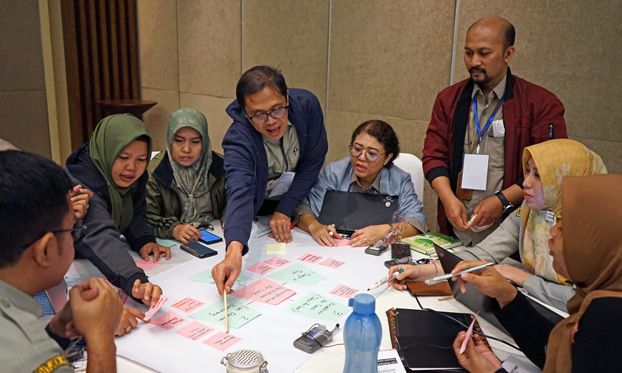 © FAO/Alia Dwirahmani | INDONESIA Foresighting Indonesia's livestock sector: mitigating climate-driven zoonotic disease risks From 15 to 16 July, FAO and the Directorate General of Livestock and Animal Health Services (DGLAHS) at the Ministry of Agriculture (MoA), with support from USAID, held a Foresight workshop on the impact of climate change on livestock production. The event featured presentations from FAO RAP foresight expert Peter Black, the Indonesian Meteorological Agency (BMKG), and representatives from the livestock industry. BMKG highlighted a potential temperature rise of over 2°C by 2045, while industry experts discussed the need for improved livestock management and increased government involvement.
|
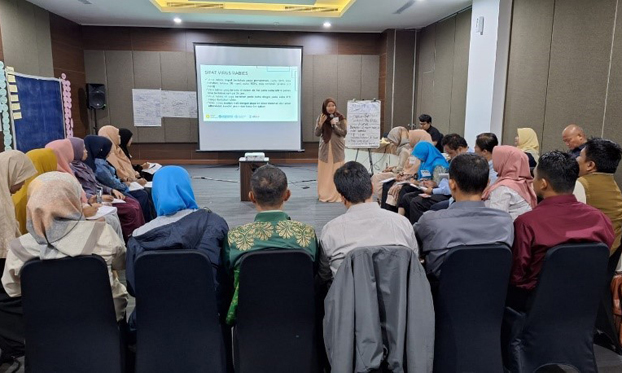 © FAO/Ratmoko Saputro | INDONESIA Training teachers for zoonosis awareness in schools of West Java FAO and the Directorate of Veterinary Public Health, Indonesian Ministry of Agriculture (MoA), with support from USAID, conducted a training programme for selected teachers and headmasters in the Sukabumi district, West Java between 15 to 19 July. The training aimed to implement an independent learning curriculum focused on zoonoses awareness for elementary and junior high school students. Facilitators from the MoA, Balai Besar Guru Penggerak (BBGP) West Java, and FAO conducted the training. As a result, teachers from 10 elementary and 10 junior high schools in Sukabumi district can now incorporate zoonoses awareness into their classrooms.
|
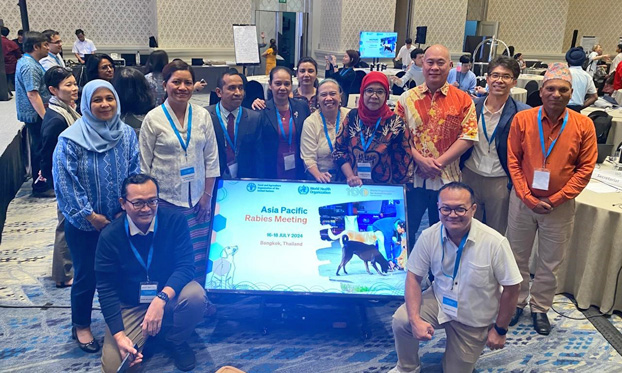 © FAO/Ahmad Gozali | INDONESIA Asia Pacific regional rabies meeting FAO and Indonesian Ministry of Agriculture (MoA) participated in the Asia Pacific Regional Rabies meeting in Bangkok, organized by the Tripartite (FAO-WHO-WOAH) from 16 to 18 July. The meeting offered a platform for members in the Asia-Pacific region to enhance, innovate, and sustain cross-sectoral coordination and collaboration between the human and animal health sectors. The goal was to accelerate the prevention, control, and elimination of dog-mediated human rabies through a One Health approach and to achieve the global objective of "Zero by 30." During the meeting, updates on new strategies and tools from the Global and Regional Tripartite and partners were shared to speed up efforts in combating dog-mediated human rabies.
|
| Learn more about our work on One Health here. | |
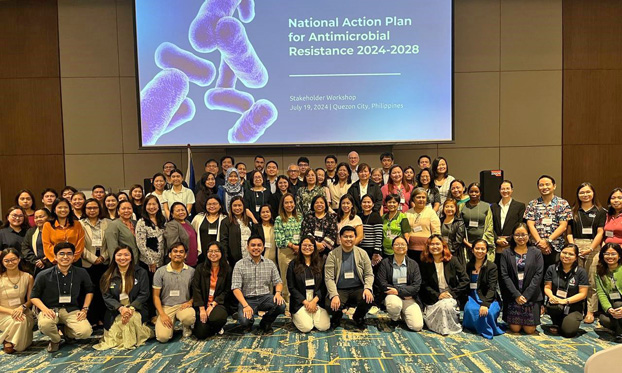 © EU AMR Project | THE PHILIPPINES Assessing the progress of the Philippine National Action Plan on Antimicrobial Resistance
On July 19 2024, the Interagency Committee on Antimicrobial Resistance (ICAMR), FAO, WHO, and the Ateneo Center for Research and Innovation (ACRI), organized a stakeholders' consultation meeting to assess the progress of the Philippine National Action Plan on Antimicrobial Resistance (AMR) 2019-2023 and to discuss the development of a new plan for the period of 2024-2028. The meeting was attended by member agencies of the ICAMR and other agencies involved in the implementation of AMR activities in the country. This workshop was funded by the European Union-Regional Tripartite AMR Project with technical support from the Fleming Fund and the USAID GHS Project. |
Learn more about our work on AMR here.
| |
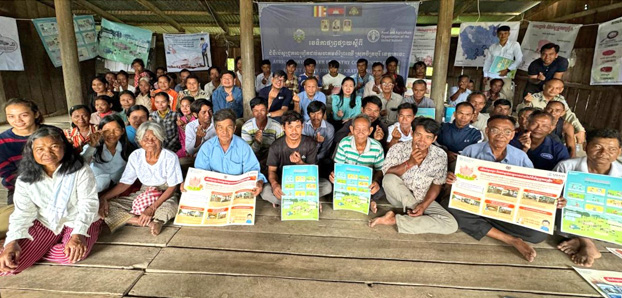 © Forestry Administration (FA), Cambodia | CAMBODIA ASF community forums in Kratie Province
FAO and the General Directorate of Animal Health and Production (GDAHP), in collaboration with the Forestry Administration (FA), co-organized eight ASF forestry community forums from 23 to 26 July, in Chet Borey district, Kratie province. With funding support from the Defense Threat Reduction Agency (DTRA), the event focused on conserving wild pigs and protecting them from ASF, raising awareness about the risks ASF poses to both domestic and wild pig species. The forum also aimed to advocate for improved biosecurity measures at pig farms and wildlife conservation facilities, as well as to promote early detection and reporting at these sites. |
Learn more about our work on ASF here.
| |
